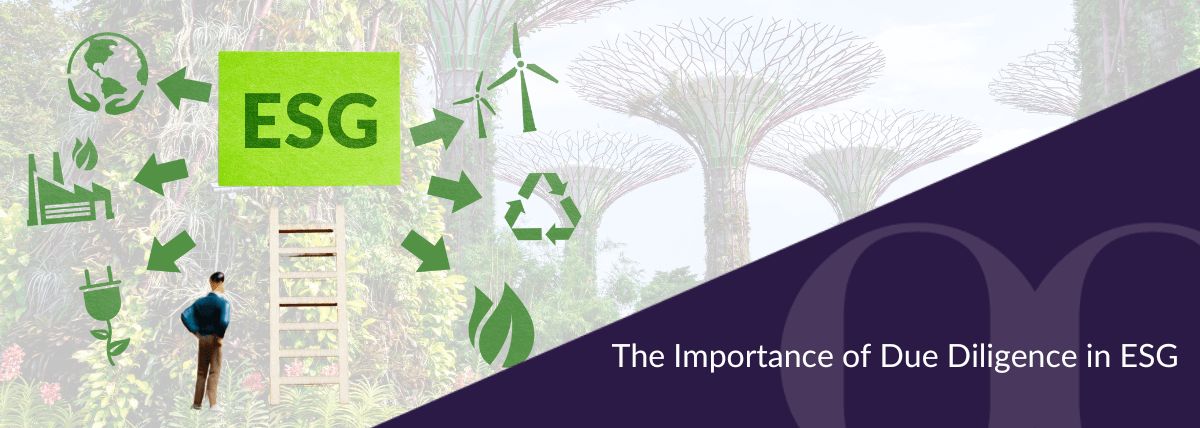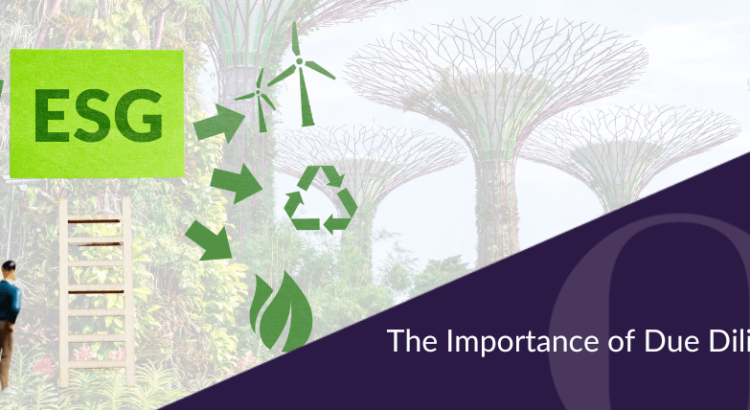In today’s business landscape, Environmental, Social, and Governance (ESG) considerations are gaining importance among investors and consumers in Singapore. Conducting due diligence in ESG is essential for informed decision-making, fostering sustainable practices, and enhancing transparency and trust. Explore the significance of ESG due diligence and its impact on corporate reputation, financial outcomes, and capital access. Gain valuable insights into ESG principles, the due diligence process, and the common challenges encountered by organisations in Singapore.
What is ESG?
ESG, which stands for Environmental, Social, and Governance, represents a comprehensive evaluation framework for assessing a company’s performance across these three dimensions:
What is Due Diligence in ESG?
Due diligence in ESG entails a comprehensive investigation and assessment of a company’s strategies and policies in these domains. This includes scrutinising the company’s impact on the environment, society, and stakeholders, along with its governance and ethical framework.
In the process of ESG due diligence, investors and businesses in Singapore analyse various aspects, including the company’s environmental footprint, waste management strategies, treatment and diversity of employees, customer safety and satisfaction, community involvement, board composition, executive compensation structure, and adherence to ethical business norms. Through this thorough examination, stakeholders determine whether the company aligns with established ESG standards and principles.
What Are the Steps in Navigating Due Diligence for ESG in Singapore?
Conducting due diligence for ESG purposes involves a structured process comprising five key steps:
Clearly outline the priorities and criteria crucial to your organisation, covering environmental impact, social responsibility, and corporate governance. These benchmarks will shape your investigative direction.
Acquire comprehensive data on ESG performance, such as environmental footprint, labour standards, board diversity, and disclosure practices. Utilise diverse sources such as public disclosures, corporate reports, and third-party assessments for a well-rounded evaluation.
Analyse the collected data and consider the potential risks and implications associated with ESG practices.
Foster direct engagement with stakeholders to gain deeper insights into the company’s operations and policies. This interactive process facilitates inquiries and addresses concerns effectively.
Evaluate the company’s ESG practices based on industry standards and regulatory mandates. Document your findings and disseminate them to relevant stakeholders, including investors and shareholders. By sharing insights, you foster transparency, accountability and facilitate potential positive transformations within the organisation.

Why Is Due Diligence Important in ESG?
1. Making Informed Choices and Mitigating Risks
Thoroughly examining a company’s environmental, social, and governance practices is essential for aligning with ESG standards and principles. This approach enables stakeholders to make decisions that embrace not only financial gains but also the company’s sustainability and ethical footprint. Identifying potential environmental, social, or governance concerns empowers investors and businesses to make informed and prudent choices, preventing potential financial and reputation-related risks.
2. Driving Positive Transformation
By meticulously documenting findings, stakeholders can hold companies accountable for their impact on the environment, society, and governance. This accountability encourages companies to adopt more sustainable and ethical approaches. This accelerates a ripple effect where companies strive to enhance their ESG standings, fostering a more sustainable and ethical business environment.
3. Fostering Trust and Transparency
By disseminating findings to relevant stakeholders, including investors, shareholders, and the company itself, there’s enhanced transparency and accountability regarding ESG practices. This promotes trust among stakeholders and bolsters the company’s reputation as a responsible corporate citizen.
4. Ensuring Regulatory Adherence
In Singapore, companies are bound by various laws and regulations, such as the Environmental Protection and Management Act and the Companies Act, which mandate transparency and disclosure of ESG practices. Non-compliance can lead to legal consequences and tarnished reputations for companies.

Common ESG Due Diligence Challenges in Singapore
While conducting due diligence for ESG is imperative for businesses, several challenges may arise during the process:

How BoardRoom Supports ESG Due Diligence in Singapore with SME Grant Assistance
Conducting ESG due diligence presents challenges, especially in precise data collection, reporting, and analysis. BoardRoom’s team of experienced ESG professionals have the expertise in multiple APAC jurisdictions to help you help you develop and implement a tailor-made ESG strategy for your business, supporting ongoing sustainability and profitability as a result.
Our ESG advisory service includes helping you identify relevant ESG risks and opportunities, setting ESG targets, creating sustainability reports, conducting a materiality assessment, drafting a sustainability policy for your company and ESG due diligence.
Contact us for a consultation now.
Contact BoardRoom for more information:
Related Business Insights
-

17 Oct 2024
Payroll Best Practices: Your Guide To Financial Services Payroll Management
Effective payroll management in financial institutions is key to compliance and risk reduction. Find out what you c …
READ MORE -

07 Oct 2024
Your Guide to Global Mobility Tax Solutions
Discover ways to navigate tax and compliance when working with international assignments with global mobility tax s …
READ MORE -

06 Sep 2024
Case Study: Optimising Tax Efficiency in Profits Repatriation
Discover how BoardRoom's two-step tax approach helps a multinational conglomerate evaluate tax-efficient profit rep …
READ MORE


